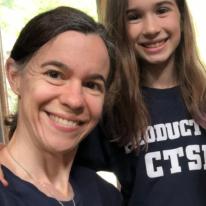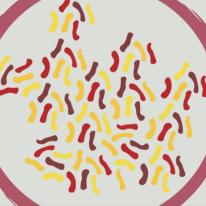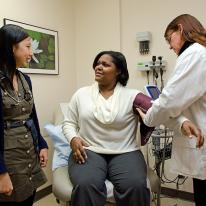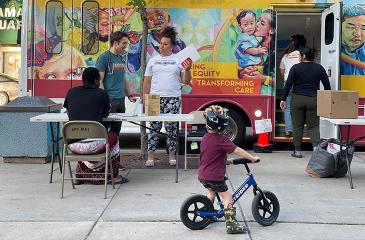Through collaborative efforts like the Mobile Health Initiative (MHI), we are working to address health disparities and implement innovative models of healthcare. MHI unites University health professionals and students with organizations that understand the barriers their communities face, including transportation, costs, language barriers, and the mistrust that can be caused by the limited cultural competency of healthcare institutions.
Since 2020, MHI has had hundreds of events and seen thousands of people throughout the state, many in rural areas. They have provided hundreds of wellness checks and immunizations, and many more services including dental, vision, nutrition, pharmacy, referrals, and emergent community response for new arrivals to the state. This summer, MHI has continued its work with migrant farm workers to improve access to quality medical care in these rural underserved communities.
Though born out of the pandemic as a response to declines in preventative healthcare, mobile health is here to stay. The value of mobile healthcare is clear: It helps save lives and reduce costs by providing care and information early, rather than treating serious and chronic health problems downstream, oftentimes too late.
Through MHI, we are preparing learners with valuable skills in front-line healthcare delivery and improving health access in communities across Minnesota.
Driving Innovation and Discovery

SDG Grant Supports Assessing Nurse Practitioner Competencies in Sub-Saharan Africa
The family nurse practitioners (FNP) role has been shown to increase access to quality, safe primary care for populations that have not had this access before. With support from OACA, Dorcas Kunkel, RN/PHN, DNP, is leading a study to assess the relevancy of an existing set of core competencies for training and practice of advanced practice nurses in primary health care contexts, in particular FNPs in Liberia and for additional application in Sub-Saharan Africa.

Accepting Proposals: RC2 High Impact Specialized Innovation Programs
The High Impact Specialized Innovation Programs support the development and demonstration of unique capabilities, research platforms and resources to address critical gap areas and roadblocks in clinical and translational science at awarded UM1 Clinical and Translational Science Awards (CTSA) Program Hubs. Successful programs supported through this funding opportunity are expected to lay a strong foundation for future adoption or dissemination of capabilities to additional CTSA Program Hubs. Proposals due to CTSI Sep. 1.

Mothers Leading Science Program
Mothers Leading Science is a year-long career development program for research-intensive health sciences faculty who are mothers of school-age or young children. It aims to address gender disparities in leadership and support women in academic research. The program offers dedicated programming, peer support, networking, and resilience training through regular meetings, an annual retreat, ongoing evaluation and self-assessment. Application deadline is Oct. 2 for the 2024 cohort.

Microbiome and Cancer Symposium
The third annual Microbiome and Cancer Symposium at the University showcases research at the intersection of the microbiome and cancer, fostering collaborations between experts in these fields. The event targets U of M researchers, clinicians, and scientists interested in incorporating microbiome investigation into their cancer research. Registration closes Sept. 15.
Advancing Interprofessional Education & Training

Instructors: Include This Interprofessional Activity As You Plan Fall 2023 Classes
The Interprofessional Geriatric Case Competition provides an interprofessional learning opportunity for teams of undergraduate and graduate students from different disciplines to gain simulated experience in creating a care plan for a complex older patient with multiple chronic health conditions. Consider offering optional credit or up to 12 clinical hours in your fall 2023 course syllabus. Students will be placed in an interprofessional team supported by a faculty or community expert coach, and work together to create and present an innovative 25-minute case presentation. The competition will be in late September through early November.
Partnering with Communities

Project REACH: Advancing Mental Health in Kittson County
Jeanna Kujava is a member of Project REACH, a year-long health policy and leadership training program. Through the program, she focused on improving access to mental health services and trauma-informed care in Kittson County. “Project REACH was a phenomenal opportunity to build upon policy and advocacy skills,” she said. “Policy and advocacy work can be compared to a marathon and not a sprint. I was looking for a new way of performing my work that would be sustained into the future with ongoing impact. Project REACH allowed me to build partnerships with experts that I will be forever grateful for and with tools that I now use daily in my personal and professional role.”

Celebrating National Community Health Center Week: CUHCC Provides Whole-Person Care
Community-University Health Care Center (CUHCC) helps increase access to crucial primary care by reducing barriers such as cost and lack of insurance, and bridging distance by bringing care to communities, and on-site language interpretation for their patients. The clinic, located in the heart of the Phillips neighborhood, serves almost 10,000 patients per year in 55 different languages. It also serves as an essential training site for health sciences learners. This National Health Center Week, CUHCC is teaming up with the Mobile Health Initiative to provide free vision screenings to CUHCC patients and community members.
U-Wide Events and Opportunities

Abstract Nature Imagery in Healthcare: Community Webinar with Craig Blacklock
Discover the power of abstract nature imagery in healthcare and mindfulness during this community webinar on Aug. 16 with photographer Craig Blacklock. Explore his latest work, “Light Waves,” capturing Lake Superior’s reflection in purely abstract form. Learn how these images can enhance healing spaces and mindfulness-based meditation.

Virtual Nexus Summit 2023: Working Together for Impact
This year’s Summit has been designed to move toward Knowledge-Based Leadership (IPE Version 5.0), with an emphasis on action. This is a forum for deep, rich learning opportunities, and a space for community building. Explore opportunities offered this year to engage as a member of this interprofessional community.



